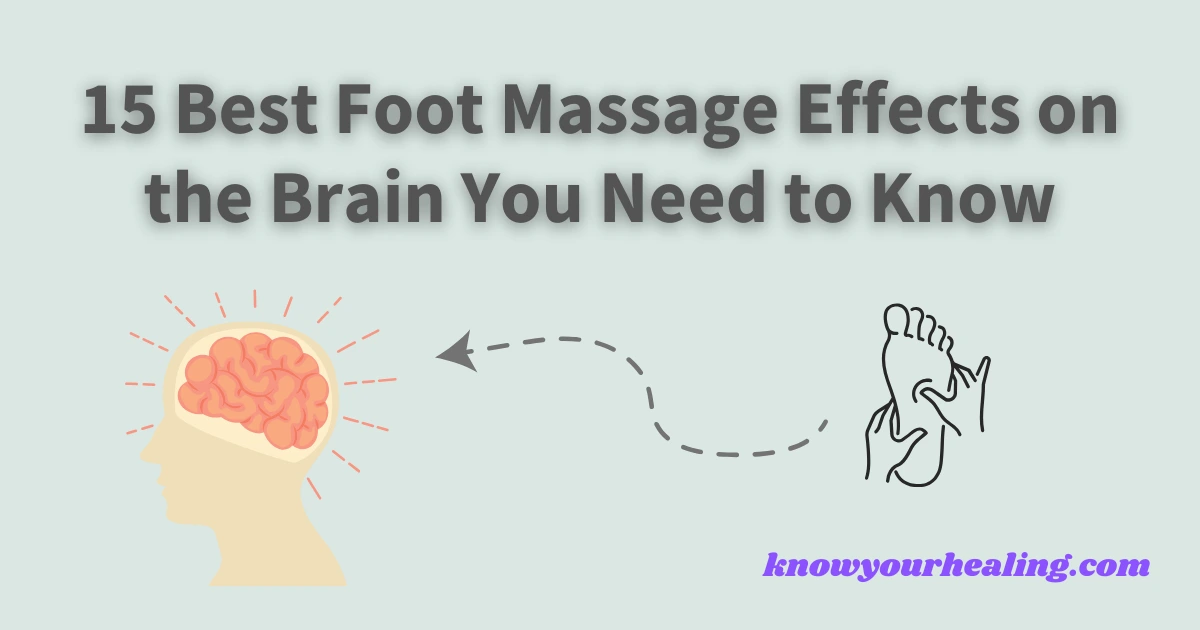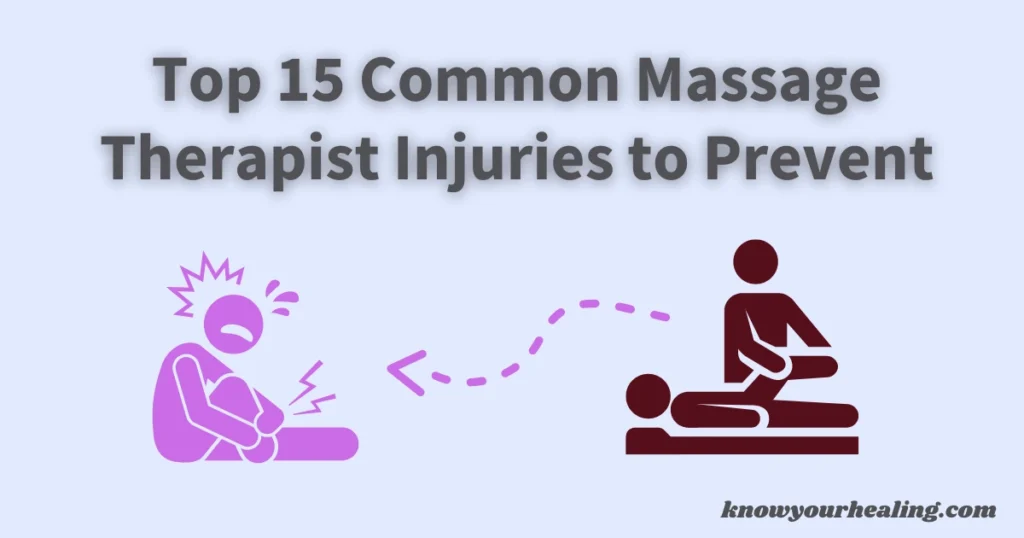Foot massage effects on the brain are gaining attention due to their potential to improve well-being. Many people seek ways to reduce stress and enhance mental clarity.
This article explores the mental benefits of foot massages and their impact on key brain areas.
You will discover intriguing insights that connect physical touch to mental relaxation, highlighting how foot massages can improve mood and cognitive function.
Improved Deep Relaxation Response
Foot massage’s effects on the brain can be profound, as foot massage significantly triggers the body’s deep relaxation response. This type of massage targets specific pressure points connected to various body parts through a concept known as reflexology.
Reflexology balances the body’s systems by applying pressure and encouraging relaxation.
When these pressure points are stimulated, they can send signals to the brain, promoting the release of relaxation-inducing hormones like serotonin and dopamine. This can create a calming effect on the entire body, leading to more profound relaxation.
Increasing these hormones can help reduce stress and encourage a sense of calm and well-being.
One study highlights that a foot massage can significantly enhance brain activity related to relaxation and stress relief. This response is particularly beneficial for individuals dealing with stress or anxiety, offering a comforting and reassuring solution.
Regular foot massages might offer a natural way to boost mood and promote mental relaxation. These benefits are supported by studies like those discussed in the Journal of Alternative and Complementary Medicine, showing increased effectiveness in brain relaxation areas.
Increased Serotonin Production
Foot massages have been shown to stimulate the production of serotonin, a critical neurotransmitter that helps regulate mood and promote feelings of well-being. This chemical plays a vital role in happiness and emotional balance.
Serotonin is essential for mood stabilization. It contributes to feelings of comfort and satisfaction. A serotonin deficiency can lead to mood disorders like depression and anxiety.
Massages, including foot massages, can enhance serotonin levels. The physical pressure and rhythmic movements help activate the parasympathetic nervous system, which releases more serotonin, improving overall mood and stress relief.
According to experts, listening to music can also increase serotonin production. Music activates the pleasure centers in the brain. Combined with a foot massage, it can lead to a more significant release of serotonin and enhance relaxation.
Regular foot massages may positively affect mental health by increasing serotonin levels. This can lead to improved mood and reduced stress, fostering a sense of hope and optimism for one’s mental health.
Enhanced Neuroplasticity
Foot massage effects on the brain include promoting neuroplasticity and the brain’s ability to change and adapt in response to experiences and training. This process involves strengthening existing neural connections and creating new ones.
Massage can stimulate the parasympathetic nervous system, which helps calm the body. This promotes relaxation and could enhance brain plasticity over time. The activation of the parasympathetic system is believed to contribute positively to neurological health.
Reflexology, a type of foot massage, may also play a role. The foot is seen as a reflection of the body, with reflex points corresponding to different organs.
Stimulating these points could positively affect the nervous system, improving neuroplasticity. The exact mechanism remains under study, but the potential benefits are noteworthy.
Moreover, research suggests massage can trigger brain changes after nerve injury. By activating certain parts of the nervous system, massage can enhance neurological recovery.
Individuals dealing with stress or seeking better brain health might consider incorporating regular foot massage into a broader wellness routine. This practice could help improve the brain’s capacity to adapt and reorganize, fostering a sense of hope and optimism for lifelong cognitive health.
Reduction of Cortisol Levels
Foot massage can significantly lower cortisol levels, the body’s primary stress hormone. The adrenal glands release cortisol in response to stress and help regulate various functions, such as metabolism and immune response. Lowering cortisol can provide relaxation and enhance overall well-being.
Studies have shown that regular foot massages help reduce stress levels by calming the nervous system and decreasing muscle tension. This, in turn, can lead to improved mental health and increased stress resilience.
Foot reflexology, a specific type of foot massage, has been found to relieve stress by targeting pressure points connecting to the brain. This practice may enhance the function of particular brain areas, contributing to a more relaxed state of mind.
Research has reported that reflexology sessions decrease cortisol levels, which benefits mental stamina and reduces anxiety.
In addition, massage therapy is recognized for its practical ability to lower cortisol levels.
Consistent foot massages help with immediate relaxation and cultivate long-term habits that improve one’s ability to handle stress. They promote a sense of calm and control over one’s mental health.
Through these mechanisms, foot massage is a valuable tool for reducing cortisol and improving mental health.
Boosted Blood Circulation to the brain
Foot massages can enhance blood flow, reaching vital organs like the brain. Improved circulation delivers oxygen and nutrients, supporting overall brain performance.
When the pressure is applied to specific points on the feet, it stimulates blood vessels and enhances their function. This process supports cardiovascular health, which is crucial for maintaining robust blood flow to the brain.
Foot massages may enhance cognitive functions by increasing blood flow to the brain. Better blood flow supports areas responsible for memory and strategic thinking.
Massaging the feet may also help reduce blood pressure, a known factor affecting blood flow to the brain. Lower blood pressure can ease vessel stress, promoting healthier circulation.
Foot massages provide a natural way to encourage improved blood circulation. Whether used to relax or revitalize, the benefits often extend to brain health.
Alleviation of Headache Symptoms
Foot Massage Effects on the Brain include helping to reduce headache symptoms. This practice involves applying pressure to specific points on the feet, which are believed to connect to various parts of the body.
A key benefit of foot massage is stimulating blood flow to the brain. During stress or tension, blood vessels may constrict, reducing blood flow and intensifying headaches. A foot massage can increase circulation and potentially ease these symptoms.
Foot reflexology targets specific areas on the feet to address headaches. For instance, the pituitary reflex involves using the thumb to press and circle the middle of the big toe. This technique may help calm the mind and clear the head by influencing the pituitary gland, also known as the “master gland” of the body.
Foot reflexology views the foot as a mirror of the entire body. The toes correspond to the head and brain area. Massaging these areas can relieve headache sufferers by stimulating related pressure points and possibly reducing discomfort.
Practices such as acupressure, a form of traditional Chinese medicine, aim to balance the body’s energy and alleviate pain associated with headaches by working on specific foot pressure points.
Stimulation of Brain Nerve Endings
Foot massage is about relaxation and stimulating the brain’s nerve pathways. The foot contains thousands of nerve endings connecting to different body parts.
When a professional applies pressure to these areas, signals are sent to the brain. This process can help improve mental clarity and focus, enhancing overall well-being.
Reflexology, a foot massage technique, taps into specific points or zones on the foot that correspond to various organs and systems of the body. Through accurate manipulation, it can release endorphins, the body’s natural painkillers and mood enhancers.
Activating these nerve endings during a foot massage can potentially support brain health.
According to the article at Neurolaunch, this practice may lead to increased brain stimulation, which could help with cognitive functions.
Similarly, research in Very Big Brain highlights that stimulating nerve endings in the feet sends signals to the central nervous system and brain. These signals might contribute to better memory and concentration.
By engaging these nerve pathways, foot massages could offer a unique way to foster a healthy mind-body connection.
Promotion of Quality Sleep Patterns
Foot massages can significantly enhance sleep quality by reducing stress. Massage therapy has been shown to lower cortisol levels, a hormone linked to stress. By easing stress, individuals can experience better sleep patterns.
Massage helps activate the parasympathetic nervous system, which calms the body and promotes relaxation. This physiological change can encourage more restful sleep.
Blood circulation is another vital factor impacted by foot massage. Improved circulation can improve oxygen flow, relax muscles, and reduce tension, supporting deeper and uninterrupted sleep cycles.
Foot massage also helps alleviate body discomfort by minimizing muscle tension. Less discomfort means fewer sleep disturbances, contributing to a more consistent and rejuvenating sleep experience.
Foot massages also provide a sense of grounding and comfort. This sensation can help calm mental activity, allowing the mind to drift into a peaceful state more easily. Hence, an individual may find falling asleep easier and staying asleep.
Reduction in Stress and Anxiety
Foot massage effects on the brain can significantly help reduce stress and anxiety by relaxing the muscles and promoting a calming effect on the mind.
When pressure is applied to specific reflex points on the foot, the body and mind react positively. These points are connected to different parts of the body. Consistent treatment may improve mood and reduce stress levels.
Reflexology, a practice where pressure is applied to specific foot areas, is known to help rebalance the lymphatic and endocrine systems. This can boost circulation and help the body relax. Consequently, this practice may induce a state of calmness and aid in reducing anxiety.
Studies have shown that after regular foot reflexology sessions, anxiety decreases significantly. This is due to massage therapy’s soothing nature, which lends greater relaxation to individuals. Many find it a therapeutic escape, enhancing mental comfort.
Foot massage might be especially beneficial for people with dementia. It has been found to improve mood and reduce agitation in these individuals. Using foot massage as a calming strategy can help manage daily stress and support emotional health.
Activation of the Limbic System
The limbic system plays a vital role in regulating emotions and memories. It is often referred to as the emotional brain. This part of the brain includes structures like the hippocampus, amygdala, and thalamus.
Foot massages can help activate the limbic system and have a calming effect. This soothing impact is believed to reduce stress and promote emotional well-being. Foot massage may provide a gentle pat on the back for the brain’s emotional center.
A foot massage can influence neurotransmitter levels. It may encourage the release of chemicals like serotonin and dopamine. This release helps manage mood and can lead to increased relaxation. Such changes might enhance feelings of happiness and reduce anxiety.
Foot massage is not only about relaxation. It also beneficially engages the brain. This engagement may improve psychological health by stimulating the brain’s emotional and memory processing. Essential oils inhaled during a foot massage can further boost the limbic system.
For those interested in therapies like reflexology, foot massage can also stimulate endorphin production. Endorphins are chemical messengers that help reduce stress and pain, enhancing overall brain function.
Elicitation of Positive Emotions
Foot massages can evoke positive emotions by relaxing the body and reducing stress. This form of touch therapy may release endorphins, chemicals in the brain that help create feelings of happiness and relaxation.
Another potential benefit is an improvement in mood. As tension eases, individuals may experience an uplift in their mental state.
Simple, gentle pressure on different parts of the foot can soothe the nervous system.
Foot massages may also encourage a sense of connection and comfort. This nurturing touch can make individuals feel more grounded and secure, potentially improving emotional well-being.
For some people, a foot massage may provide a moment of meditation or mindfulness. The focused touch lets them concentrate on the present and let go of worries. This state can promote a peaceful mind and emotional release.
Reflexology practitioners suggest that the feet hold a map of various body parts. Massaging these areas is believed to evoke specific emotional responses. For example, the toes are linked to the head and brain. Stimulating these areas can trigger calming effects.
Improved Memory Retention
Foot massage can enhance memory retention. This process is linked to increased blood circulation, which boosts the oxygen supply to the brain. Oxygen is crucial for neurons to function effectively.
Reflexology, a form of foot massage, may contribute to stress reduction. Easing stress can help the brain function more smoothly, aiding memory retention.
Chronic stress is known to impair me, so any reduction can be beneficial.
Moreover, foot massage encourages the release of beneficial neurotransmitters like serotonin and dopamine. These chemicals help regulate mood and cognitive functions. This regulation can enhance synaptic connections in the brain.
Foot massage is not only relaxing but also potentially invigorates the mind. Simple techniques might help an individual experience better focus and improved cognitive abilities. This connection between the feet and the brain is both fascinating and practical.
Studies have shown promising results, but more research could solidify these findings. For those seeking non-invasive ways to support brain health, foot massage might be worthwhile.
Regular sessions can improve overall brain function, including memory retention.
Decrease in Depression Symptoms
Foot massage can help reduce symptoms of depression. By focusing on specific pressure points, foot massage helps release tension in the body, leading to a more relaxed state of mind.
The calming effects of a foot massage can promote the release of serotonin, a neurotransmitter that contributes to well-being and happiness. Elevated serotonin levels can help improve mood and reduce feelings of sadness.
Foot massage may also lower cortisol levels. Cortisol is a stress hormone that, when elevated, can contribute to anxiety and depression.
Reducing cortisol through relaxing massage techniques can create a sense of calm and balance.
In a study on foot reflexology, it was shown that targeted foot massage can help lessen the symptoms of depression and anxiety. This approach may be used alongside other treatments for mental health.
Additionally, massage therapy can create a sense of connection. This is important for people experiencing depression, as they may feel isolated. The physical touch involved in a foot massage can foster a feeling of comfort and support.
Enhanced Concentration Abilities
Foot Massage Effects on the Brain can substantially enhance concentration abilities. By improving blood circulation, foot massage promotes better oxygen flow to the brain, which assists in achieving sharper focus and sustained attention during tasks.
Foot reflexology is often used to target specific pressure points. Stimulating these areas is believed to support brain functions related to concentration.
Reflex points on the feet, such as the toe tips, are linked to the head and brain region.
Regular foot massages may also lead to increased relaxation. When the body is relaxed, stress levels are lowered, potentially allowing the mind to concentrate more effectively. It creates an environment where mental clarity can thrive.
Additionally, studies have shown that massage techniques can activate brain regions involved in cognition. For instance, a 2018 study highlighted how foot massage could boost oxytocin release and activities associated with social cognition.
This activation can indirectly enhance attention and concentration skills.
Massages for the foot can offer simple yet effective benefits for concentration. These techniques not only provide physical relief but also support mental wellness. Individuals might improve their concentration ability by incorporating foot massage into a routine.
Improved Mood Stability
Foot massage can significantly contribute to mood stability. Regular massages have been found to help balance neurotransmitters, which are chemicals in the brain responsible for transmitting signals and maintaining mental health. This balance can lead to a more stable mood and reduced symptoms of anxiety.
When people receive a foot massage, it often decreases cortisol, a hormone associated with stress. Lower cortisol levels promote relaxation and calmness, making individuals feel more at ease in their daily lives.
The practice also stimulates the release of endorphins, often known as “happy hormones.” These natural chemicals enhance feelings of well-being, which can help manage mood swings and promote a positive outlook.
Foot massage, mainly through reflexology, focuses on specific points on the feet that correspond to other body areas. This process can alleviate tension and improve circulation, further supporting emotional balance.
Regular foot massages can also enhance sleep quality, vital for maintaining a stable mood. Better sleep helps refresh the mind and body, improving emotional regulation.
Neuroscience Behind Foot Massage Effects
Foot Massage has a significant Effect on the Brain, as it enhances cognitive function and stimulates neural pathways. This practice may improve communication within the brain and reinforce essential connections.
Connection Between Feet and Brain
The connection between the feet and the brain is more profound than it might seem. Reflexology’s widespread practice suggests that certain areas on the feet correspond to specific body parts, including the brain. For instance, the tips of the toes are linked with the head and brain region.
Massage can enhance cognitive function, improve focus, and support memory retention when these areas are stimulated.
This connection is based on the network of nerve endings that relay signals to the brain. By activating these points, foot massage can help maintain the brain’s health and efficiency.
Stimulation of Neural Pathways
Foot massage can stimulate neural pathways by encouraging the release and regulation of neurotransmitters. Neurotransmitters are crucial for sending signals throughout the brain and body, acting like the brain’s communication system.
By balancing these chemical messengers, foot massage may improve brain function.
Foot massage also influences neuroplasticity, the brain’s ability to reorganize and form new connections.
Massage stimulation might enhance this adaptability, aiding in better cognition and learning. Regular massage can, therefore, be a valuable tool for promoting brain health and efficiency, as it provides consistent stimulation of critical neural pathways.
Mental Health Benefits
Receiving a foot massage can bring significant mental health advantages. It reduces stress and anxiety while also boosting brain function, which can have a meaningful impact on mental well-being and cognitive abilities.
Reduction in Stress and Anxiety
Foot massages are known for reducing stress and anxiety. They release endorphins, natural chemicals in the body that help improve mood.
Foot massages activate endorphins, encouraging relaxation and relief from daily pressures. The Mayo Clinic notes that massage can reduce stress by lowering heart rate and blood pressure, resulting in a calm mind.
Regular foot massages can also interrupt the stress cycle, decreasing anxiety.
People often find that the nurturing touch of a foot massage improves their emotional state, helping them manage stress better.
Enhancement of Cognitive Function
Foot massages might also enhance cognitive function. By boosting circulation, they improve blood flow to the brain, which may lead to better focus and mental performance.
Neurolaunch highlights that foot massages can enhance mental clarity and focus, providing an edge in cognitive tasks.
Massaging the feet may also help improve sleep quality. Better rest contributes to sharper cognition enhanced over memory.
Regular sessions can, therefore, have a compound effect on enhancing cognitive abilities, helping individuals stay mentally sharp and alert.
Final Thoughts
Foot massage effects on the brain are gaining attention due to their calming and therapeutic properties. This practice may aid in reducing stress, which can support mental well-being.
By applying pressure to specific points, foot massage might help trigger relaxation and enhance mood. Reflexology views the foot as a map of the body’s organs, potentially affecting areas like the brain.
Users report a potential boost in cognitive functions such as memory and concentration. This could be due to the increased relaxation brought on by the massage.
Foot massage effects on the brain can lead to improved sleep quality, which may be associated with decreased stress and anxiety, as the massage promotes a sense of calmness.




